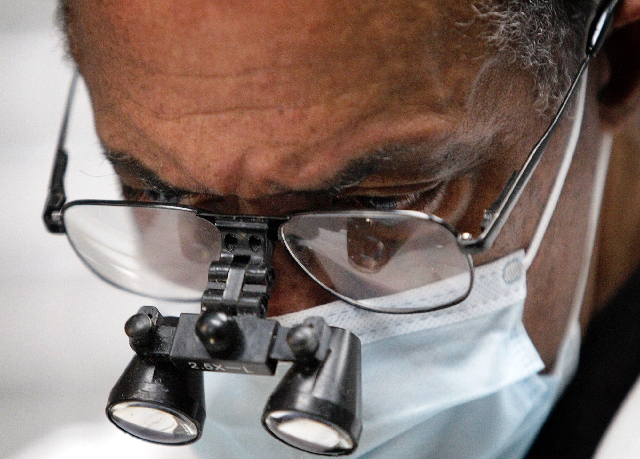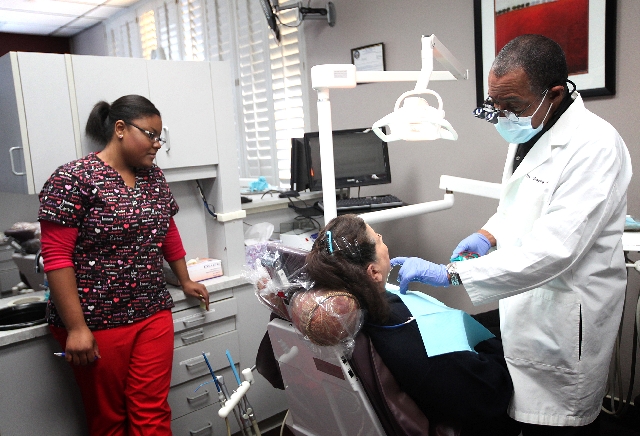African-American Las Vegas dentist thrives with personal touch



Had he seen a photograph of Dr. Greg Edwards beforehand, Christopher Chase Cripps admits he probably wouldn’t have shown up at the African-American dentist’s office in Las Vegas for emergency treatment of toothaches.
Apprehension over the unknown would have sent him elsewhere.
“Coming from where I did in Louisiana, you just didn’t think of black people in that way,” the 31-year-old white construction worker said the other day. “Black dentists were so rare you never really heard about them.”
America 2013. Black History Month. While blacks in the world of politics became common enough for the country to elect an African-American president, many people in the United States still aren’t accustomed to black dentists and doctors. Given the numbers –– less than 4 percent of each profession is African-American –– that isn’t particularly surprising.
And when you consider that psychologists say that when humans face the unknown, their primary instinct is to play it safe and distrust it, then Cripps’ admission of looking elsewhere for a dentist had he seen Edwards’ picture also isn’t surprising.
“Unfortunately, I was surprised by how well everything went,” Cripps said. “And I know I shouldn’t have been.”
Today, no one sings the praises of the 64-year-old Edwards –– one of the first five black dentists in Southern Nevada –– more than Cripps.
“Compared to my dentist back in Louisiana, he’s much more detailed and patient friendly in the way he answers your questions,” he said. “I knew it was going to be a different experience when my call on the weekend went directly to his cellphone. And when you go to his office, you find he has members of his family involved so you feel like you’ve become part of a family. Going to him made me realize that you can never generalize about who’s good at what. It’s all about the person.”
Edwards, a Los Angeles native, moved to Las Vegas in 1991 from Washington, D.C. He had practiced there after attending Howard University’s College of Dentistry in the nation’s capital.
Edwards says although he’s experienced racism in his practice — a few people have left his office once they saw he was black — the biggest reason why people sometimes dread a relationship with him has more to do with his profession than his color.
“They’re far more scared of dentists in general than me as a black person,” he said with a laugh recently as he stood near an unoccupied dental chair in his Smiles Dental Group office. “When it comes to race, it’s been much better here than I expected.”
On a recent morning, Edwards, using magnification lenses, peered into the mouth of Bea Martinez, a retired interview specialist with Clark County Justice Court. Like Cripps and so many others, she first met Edwards on a weekend when she had a dental emergency –– a specialty he has largely dominated in Southern Nevada.
“We’ve got some work to do,” Edwards told Martinez, his voice muffled by the mask he wore.
Edwards discussed with Martinez what will have to be done to her partial plate dentures. It is not news that she welcomed, but she appreciated how he delivered it.
“He takes time to explain everything in terms you can understand,” she said later. “I’m not just a dollar sign to him and rushed through like cattle. He tells you exactly how much things will cost. He doesn’t take the liberty of going ahead unless you say so.”
That Edwards, one of five children, ended up in dental school wasn’t preordained.
“So many students I went to dental school with had a father who was a dentist and they were following in his footsteps,” Edwards said. “That definitely wasn’t me.”
His dad was a barber and tailor, his mother, a bookkeeping clerk. Edwards, who scooped ice cream after school to earn money, said he wasn’t a bad student in high school, but rather “an unfocused one.”
It wasn’t until he was 19 and part of an Urban League program in data processing that he “realized I could do whatever I wanted if I put my mind to it. … Something in me just clicked.”
For a little more than a year, he pursued a degree in sociology at California State University, Northridge. He switched his major to biology because he thought his job prospects would be better. After graduation in the mid-1970s, he took a position with a pharmaceutical firm, selling prescription drugs to doctors and dentists.
“As I began to interact with more dentists, I decided that is what I should do,” he said. “I knew I had good hands for the work –– something I got from my father. Ironically, dentists used to be barbers, my father’s profession, so from a heritage and personal perspective, with my background in science, it just felt right.”
Dentists he met as a pharmaceutical representative wrote him all-important recommendation letters to Howard University, a school that had impressed Edwards for its history in educating newly freed slaves.
“Washington, D.C., was an amazing place to go to school,” he said. “You never knew who you were going to run into. One day I’m at the Florida Grill and end up talking with Jesse Jackson.”
Upon graduation from dental school, he and a friend started a dental lab in California, focusing on prosthetics. When he tired of that after a couple of years, he went back to Washington, D.C., opening a practice across from George Washington University. Not long after he visited his mother in Las Vegas, where she moved from California, Edwards decided to also make Southern Nevada home.
“The town was booming in the early ’90s and there were only something like 114 dentists,” he said. “It seemed like the perfect place to open a practice.”
Dr. James McMillan, whose arrival in Las Vegas in 1954 made him the first black dentist in Southern Nevada, soon became Edwards’ mentor, helping him with the business side of his practice. Edwards would later pass on that knowledge to another young black dentist, Dr. Timothy Wilson.
Just as he had in Washington, D.C., Edwards made himself readily available to emergency patients. He knew many dentists didn’t work on holidays or weekends. That helped him both financially and psychologically.
“It gives me such a sense of satisfaction and fulfillment to make someone look and feel better,” he said.
Dental assistant Greg Freeman has been with Edwards during many dental emergencies on Christmas, New Year’s and Thanksgiving.
“If someone calls with a toothache, he doesn’t tell them to go to the emergency room,” he said. “He wants to make sure what he chose to do in life, dentistry, is done the right way.”
After a marriage soured when his two daughters were still small, Edwards raised them alone. Michele, 22, is now his office manager and soon will attend her father’s alma mater, Howard University, doing graduate work in forensic medicine. Quintana, 20, helps out with patients as she studies to become a dental assistant. He remarried in 2007.
He shared his love for jazz with them, regaling them with stories about Art Blakey, Thelonious Monk, Dexter Gordon, Miles Davis.
“I forget which jazz festival I saw Miles at, but I saw them all live,” he said as he walked by dramatic black-and-white photos of jazz stars in his living room.
Back in 2003, in conjunction with Fitzgeralds casino, he promoted the first Jazz Las Vegas Music Festival at Hillpointe Park in Summerlin. One of the great jazz trumpeters of all time, Freddie Hubbard, performed at what became an annual event.
Jazz generally plays in the background as Edwards pursues another of his passions at home, designing websites. He now has more than 30 domains and websites, including www.jazzlasvegas.com, www.dentalemergenices.com and www.smilesdentalgrouplasvegas.com.
He’s taught good friend Steve Price how to do it.
“He also taught me how to design websites,” said eldest daughter Michele.
Over the years, Edwards has talked to public school students about going into dentistry.
“It’s a great profession,” he said. “There have been times when I’ve worked eight to 10 hours straight on a full mouth reconstruction and I felt better than I ever have. How many people can say they have taken people out of pain and given them something they haven’t had in years, a beautiful smile? I’ve changed lives and I’m proud of that.”
Contact reporter Paul Harasim at
pharasim@reviewjournal.com or 702-387-2908.











